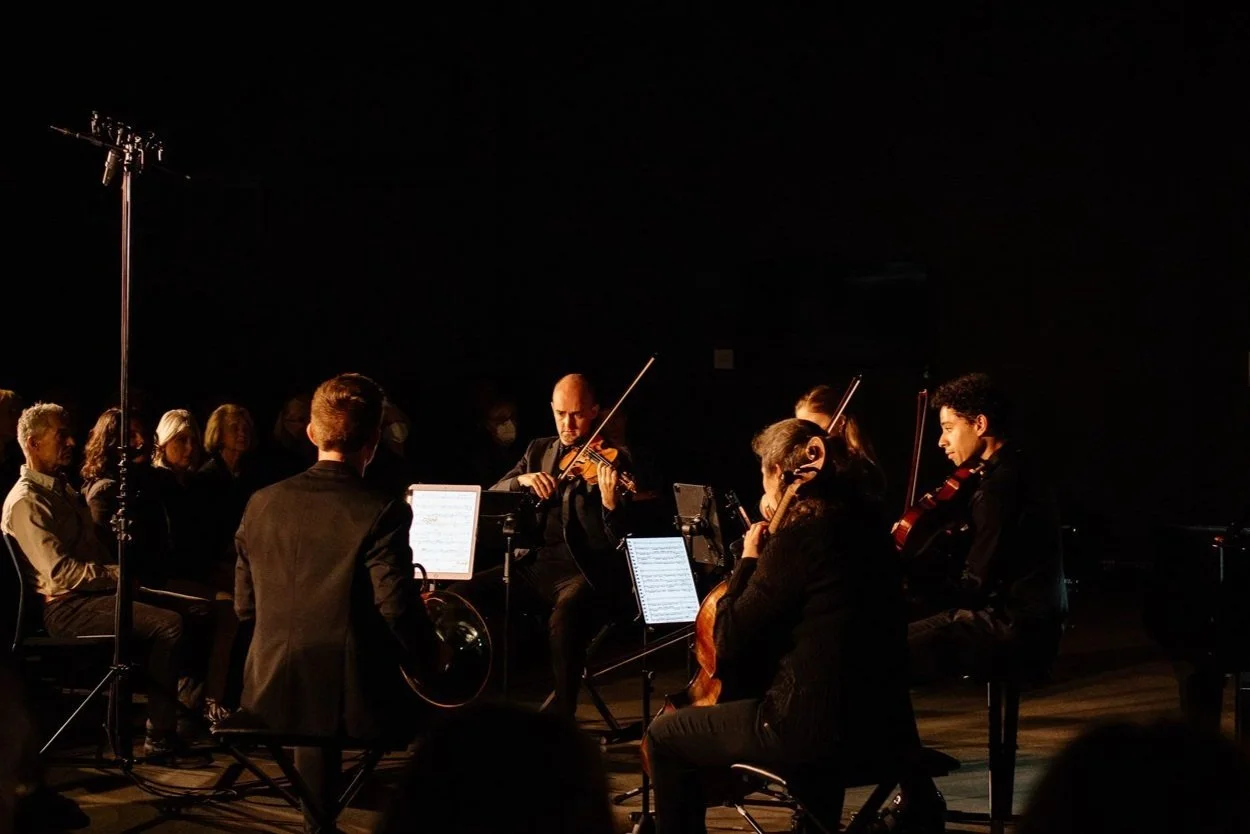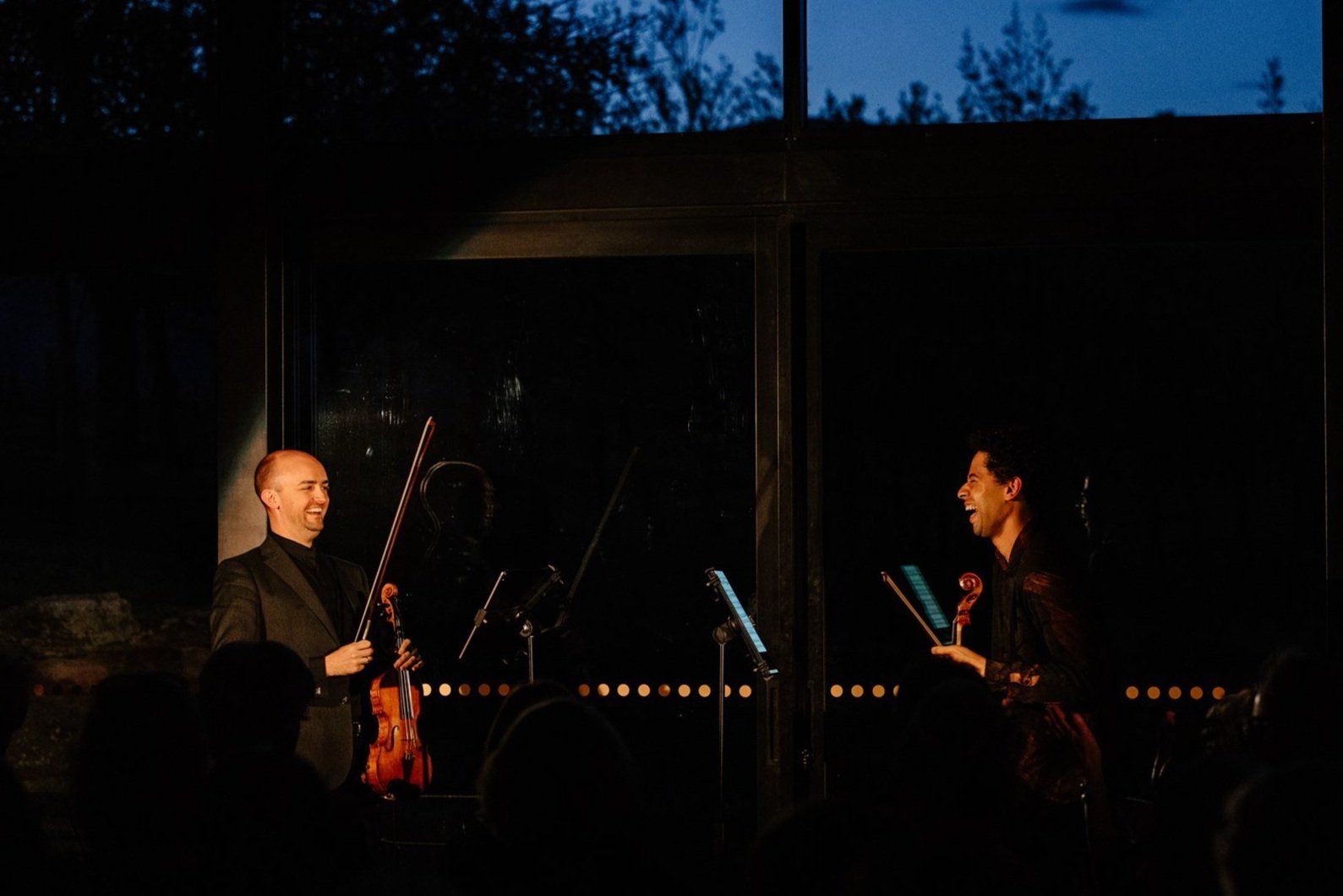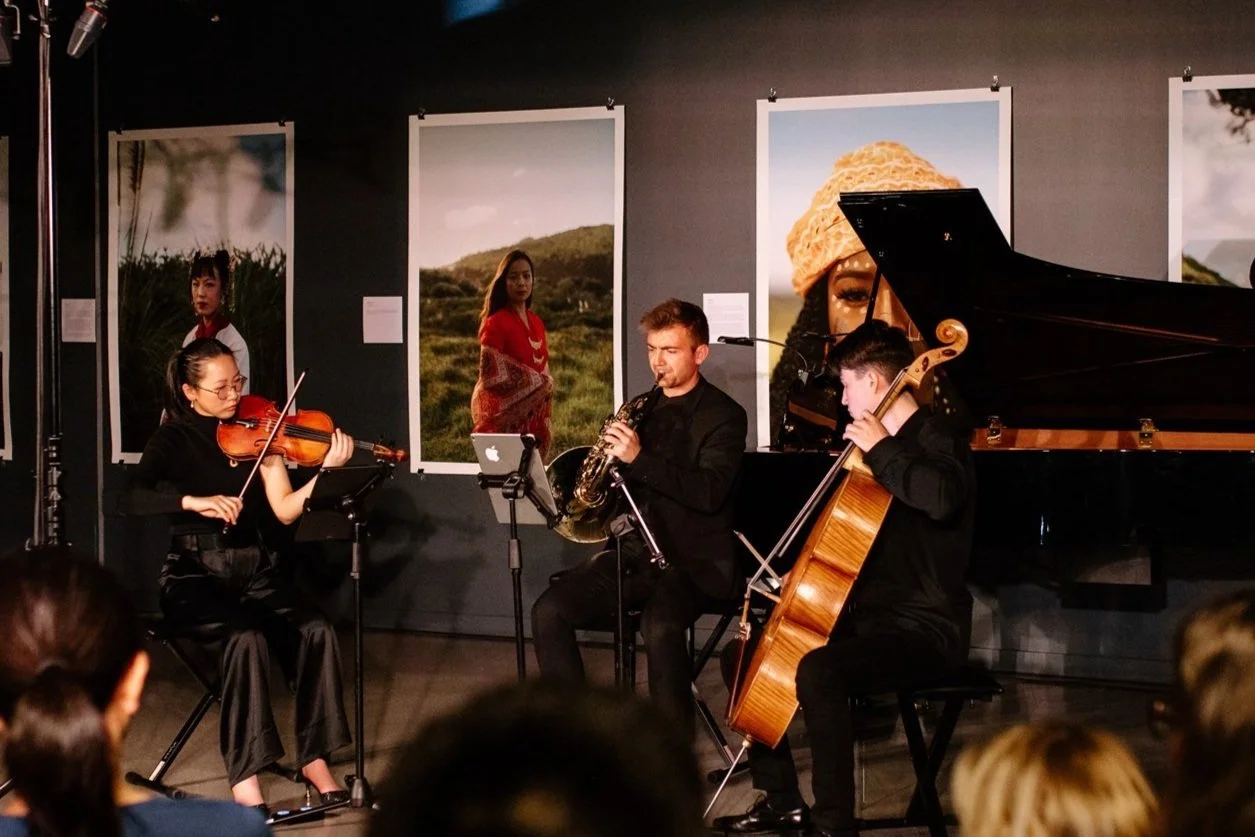At the World’s Edge Festival: electrifying ensembles
AWE musicians perform Tchaikovsky’s sextet Souvenir de Florence at Rippon Hall in Wanaka
Photo credit: Nat Symonds
“Chamber music is not about a smaller scale, it’s about higher intensity,” says London-based violinist Benjamin Baker, Artistic Director of one of Aotearoa’s newest musical events, the annual At the World’s Edge Festival (AWE).
That musical intensity thrilled audiences at the third AWE this month. Set amongst the grand scenery of the mountainous Queenstown Lakes District, the festival travelled to four small, intimate venues in the Central Otago region. This year, concerts were held at Te Atamira, a gallery space in Queenstown, Bannockburn’s Coronation Hall and two breath-taking winery settings, Cloudy Bay Shed in Cromwell and Rippon Hall in Wanaka. Four of the six main concerts were presented twice in a day to accommodate audiences without compromising the “up close” chamber experience.
On a magical sunny spring evening at Cloudy Bay, the concert began outside, audience with wineglasses in hand. Siegfried’s horn call, played by visiting UK musician Ben Goldscheider, floated over the water towards the mountains, followed by a short and appealing “birdcall” duet especially written for Festival Directors Baker and Justine Cormack by this year’s AWE composer-in-residence, Victoria Kelly.
AWE has again taken a bold and adventurous approach to programme curation, with themes for 2023 of home, culture and identity. Czech and other Eastern European composers, well-known for exploring these ideas in their music, were a programming thread throughout the week, with music by Dvorák, Smetana, Martinů, Suk, Janáček, Kodaly and Ligeti alongside Samuel Barber, Brahms, Tchaikovsky, J S Bach and Heinrich Biber.
Performance of Jamaican-British composer Eleanor Alberga’s Shining Gate of Morpheus
“…living composers were well-represented at AWE.”
Photo credit: Nat Symonds
Living composers were well-represented and contextualised with excellent introductions, inviting listeners into lesser-known works. Goldscheider brought to AWE his recently commissioned trio from senior British composer Nicola LeFanu, After Farrera, named for a village high in the Catalan Pyrenees where the composer had been in retreat. Played by violinist Vesa-Matti Leppänen, UK cellist Alice Neary and Goldscheider on horn, After Farrera is beautifully crafted with a wide expressive and timbral range, setting up a dialogue between horn and strings as two musical characters, solitary and populous.
The earliest work in the Immemorial concert in Queenstown was just 50 years old. The programme began and ended with exquisite performances of two of Arvo Pärt’s works for violin and piano, Passacaglia and the peaceful Spiegel im Spiegel, exquisitely played by pianist Jian Liu and violinists Leppänen and Baker respectively. Alfred Schnittke’s big Piano Quintet was the intense peak of the programme. Kelly spoke movingly about the influence of this searing music, dedicated to Schnittke’s late mother, which influenced her own “in memoriam” Piece for violin and piano when her father died suddenly when she was 20. Her work was also included, beautifully performed by Cormack and pianist Madeleine Xiao, one of three AWE emerging artists.
Composer-in-residence Victoria Kelly(left) talks about her music with Festival Director Justine Cormack
Photo credit: Nat Symonds
The AWE composer-in residence plays a major role in the festival. Five works by Kelly were performed, offering a fascinating overview of her composing career. In the final AWE concert, Manifesto, her Ensemble for horn, violin and cello received its world première. Introducing this compelling work, Kelly talked about different meanings of the word ‘ensemble’, not only in music but in physics and cosmology, where the phrase ‘ensemble of universes’ is found. Some of the sounds in Kelly’s strong, subtle, and communicative new trio were microtones - sounds, she suggested, that might evoke different musical universes.
The concept of ‘ensemble’ is, of course, central to chamber music and was wonderfully demonstrated throughout the whole event. Groups of musicians electrified us with extraordinary rapport and unanimity of purpose in interpreting masterpieces new and old. Visitors Goldscheider, engaging Jamaican-American violist Jordan Bak, the brilliant Neary and German-Australian violist Tobias Breider performed alongside some of New Zealand’s top musical artists, demonstrating how quickly these experienced players form close musical relationships within chamber ensembles.
Benjamin Baker (left) and Jordan Bak laugh with delight after their virtuosic performance of Martinů’s Three Madrigals at the Cloudy Bay Shed
Photo credit: Nat Symonds
There were many highlights, among the most memorable Martinů’s Three Madrigals for violin and viola, a fast and furious finisher to the Cloudy Bay concert. Played with astonishing virtuosity by Baker and Bak, these terrific young musicians were in fierce and joyous accord. In more familiar repertoire, such as Smetana’s Quartet “From my life”, Janacek’s “Intimate Letters”, and Tchaikovsky’s sextet Souvenir de Florence that ended the final Wanaka concert, we heard exceptional ensemble work from groups of musicians that had met, in some cases, just days before.
The seemingly inexhaustible Baker led from the front in numerous performances and spoken introductions. In Sei Solo he demonstrated both his outstanding musicianship and collaborative intent, working with dancers Jahra Wasasala and Ooshcon of CONJAH in a cross-disciplinary free event at Te Atamira. As the dancers wove their movements around him, Baker’s solo performance of Bach’s Second Partita, interspersed with music by New Zealanders Karlo Margetić and Gareth Farr and ending with Bach’s magnificent Chaconne, was another musical highlight. The intriguing dance aspect of this creative project, though difficult to see from some parts of the venue, drew in a large, diverse and enthusiastic audience.
Festival Directors Benjamin Baker and Justine Cormack
…they’ve created something special with their At the World’s Edge Festival
Photo credit: Nat Symonds
With their festival, Baker and Cormack have created something special and both are ambitious about making a difference as well by nurturing a younger generation. AWE has a well-designed Emerging Artists Mentoring Pathway, with three talented and aspiring young musicians, pianist Xiao, violinist Lorna Zhang and cellist Damon Herlihy-O’Brien added to the programme this year. Coaching was provided by experienced professionals among festival performers. This is no short-term commitment, either; included in this year’s artistic line-up were two members of the Pathway programme, cellist Jack Moyer and pianist Otis Prescott-Mason, who joined in 2021 at the first AWE.
Georgina Palmer, this year’s AWE Emerging Composer-in-residence, was mentored by Salina Fisher, 2021 Composer-in-residence. Palmer’s poignant and melodious new work Maramataka for horn, violin and cello was performed twice, in the impressive Emerging Artist Showcase concert and again in the Immemorial programme.
Georgina Palmer’s Maramataka in its world premiere performance at Te Atamira
Lorna Zhang (violin), Ben Goldscheider (French horn) and Damon Herlihy-O’Brien (cello)
Photo credit: Nat Symonds
AWE’s generosity continued after the main nine-day festival. Estonian/UK violinist Marike Kruup led a group of festival musicians, emerging and experienced, on a tour of Central Otago early childhood centres and schools, sharing performances and musical ideas with over 2,000 students.
Why was AWE so exhilarating? The answer may be in the way these remarkable musicians engaged so joyously in the music, both in performing it with colleagues and sharing it with audiences. Bak’s infectious laughter after his Martinů duet with Baker at Cloudy Bay, Kelly’s tears after the Schnittke quintet that had such personal meaning for her, the spontaneous haka from audience members after Sei Solo, and the open-hearted generosity of all the musicians in not only their playing but their introductions to the music, contributed to the warm sense of whanau. Of course, local wines flowed freely too. As a friend in the audience said to me afterwards, “they all feel like family now.”
AWE performers and composers after performances at Te Atamira (front row from left): Georgina Palmer (Emerging composer-in-residence), Emerging artists Madeleine Xiao (piano), Damon Herlihy-O’Brien (cello) and Lorna Zhang (violin), CONJAH dancers Ooshcon and Jahra Wasasala, Tobias Breider (viola), (back row from left) Jordan Bak (viola), Marike Kruup (violin and Education Leader), Victoria Kelly (Composer-in-residence), Benjamin Baker (violin and Artistic Director), Justine Cormack (violin and Festival Director), Vesa-Matti Leppänen (violin), Ben Goldscheider (French horn), Alice Neary (cello), Jian Liu (piano), Rolf Gjelsten (cello).
Photo credit: Nat Symonds







